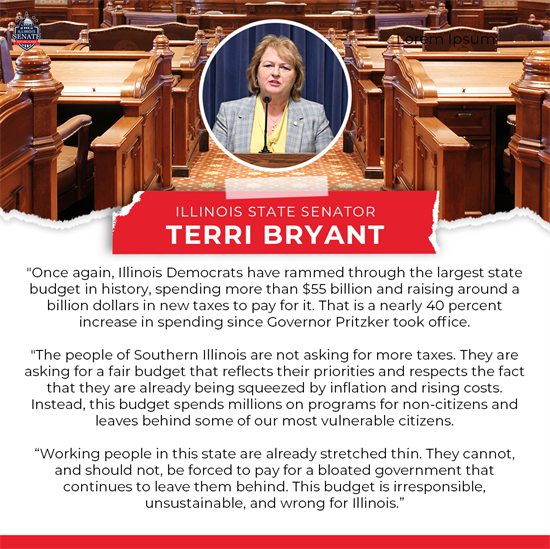 By Terri Bryant, (Murphysboro-R) Illinois State Senator
By Terri Bryant, (Murphysboro-R) Illinois State Senator
Governor J.B. Pritzker’s record-breaking spending plan, which relies on nearly one billion dollars in tax increases and gimmicks, passed the General Assembly on May 31.
Once signed into law, it will become the largest budget in Illinois history, totaling more than fifty-five billion dollars. That figure represents a staggering increase of nearly fifteen billion dollars, or almost forty percent, since the Governor first took office.
State Senator Terri Bryant voted against the proposal, arguing it reflects misguided priorities that grow government at the expense of working families.
The spending plan includes nearly $1 billion in new taxes and financial gimmicks. Among them are higher taxes on vacation rentals such as Airbnb, new taxes on gaming, increased taxes on phone services and nicotine products, and hundreds of millions in new taxes on businesses, costs that will ultimately be passed along to consumers. Democrats also relied on nearly $400 million in one-time revenue grabs and accounting tricks to balance the books.
While Democrats continue to spend millions in funding on non-citizen programs, the new budget falls short for members of the developmentally disabled community, K-12 and college students, and taxpayers who are footing the bill.
As Washington moves in the opposite direction, cutting taxes and offering real relief to working people, seniors, and families, Illinois Democrats are choosing to dig deeper into the pockets of their residents.

Republicans Block Additional Tax Hikes: But Warn the Fight Isn’t Over
While the budget includes significant new tax burdens, Republican lawmakers also blocked several of the most damaging proposals, though they caution that these ideas are far from dead and are likely to return.
One proposal would have added a $1.50 delivery tax to nearly every package shipped to Illinois homes. Far from a luxury, delivery has become essential for many working families, providing access to groceries, diapers, medications, and meals after long days on the job. This tax would have penalized the very people who rely on those services the most.
Another measure would have imposed a new service tax on routine needs like car repairs, home maintenance, and personal care. It was effectively a tax on daily life, making it more expensive to fix a leaking pipe, get a haircut, or keep a vehicle safely on the road.
A third proposal, a mom-and-pop tax on digital advertising, would have raised costs for small, family-run businesses that depend on affordable online marketing to reach customers. By making it harder for these businesses to compete and grow, the tax would also have hurt the families and communities that rely on them for jobs, goods, and services.
Lawmakers who opposed these proposals say this isn’t the end of the fight. These taxes were stopped, for now, but they are part of Governor Pritzker’s long game: growing government and shifting the cost onto the very people who can least afford it. If they return, it’s working families, seniors, and those already stretched to the breaking point who will bear the brunt.
Bryant Champions Law to Support Sparta and Southern Illinois Traditions
Recognizing the importance of the World Shooting and Recreational Complex to the community of Sparta and the broader southern Illinois region, State Senator Terri Bryant successfully passed legislation to preserve a long-standing tradition tied to the area’s economy and culture.
House Bill 2327 ensures that minors as young as 14 can continue working as scorers during major shooting events at the Sparta complex, including the U.S. Open and Grand American World Trapshooting Championships. These events bring thousands of visitors and economic activity to the region each year.
“This legislation is about more than employment. It’s about protecting an important part of southern Illinois’ identity,” said Senator Bryant. “The people of Sparta have supported the shooting complex for years, and this law ensures that the next generation can continue to be part of these world-class events.”
The bill addresses a problem created by a change to the state’s Child Labor Law, which inadvertently restricted minors from working these safe and critical jobs. House Bill 2327 carves out an exemption, allowing 14 and 15-year-olds to work at least 15 feet behind the firing line under safe, controlled conditions.
Senator Bryant says the legislation is a common-sense fix that supports local families, traditions, and economic development in a region that depends on tourism and sporting events for jobs and growth.
